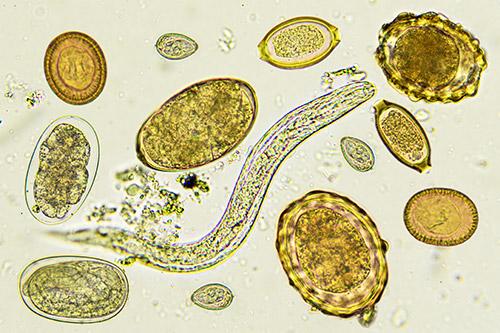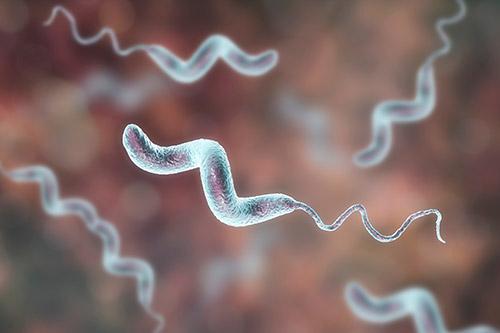How to know if you have a parasite
Published
How to know if you have a parasite
- Parasites can be microscopic single-celled organisms or larger organisms you can see, like worms.
- The main microscopic parasites we get in the UK are Cryptosporidum and Gardia which cause diarrhoea and stomach pain.
- Pretty much the only worm infection we get in the UK is threadworm (pinworm) which cause an itchy bottom.
- Parasites can be spread from person-to-person, from animals and by exposure to contaminated water or food.
Recently been travelling to far-flung places or experiencing some unexplained gut symptoms? Worried it might be a gut parasite. Unfortunately, there’s a lot of misinformation online about gut parasites. Let’s set the record straight. We’ll go through what gut parasites are, how you might get a parasite, the symptoms to watch out for and what to do about them.
What is a parasite?
A parasite is simply an organism that depends on another organism (called the “host”) for survival. This means it gets its food from the host. Parasites come in lots of different shapes and sizes - some you can see and some you can’t.
When it comes to parasites that affect our gut, there are two major types:
Unicellular parasites
These are parasites that are only a single cell in size so can only be seen using a microscope. They are also called “protozoa”. Some common protozoa you may have heard of include:
- Giardia intestinalis
- Cryptosporidium
- Entamoeba histolytica
These are all considered “pathogenic” protozoa meaning that they can cause diseases in humans. However, there are plenty of “non-pathogenic” protozoa that live in the gut and are not thought to cause any symptoms. These include:
- Entamoeba coli
- Entamoeba dispar
- Endolimax nana
- Blastocystis
Multicellular parasites
Multicellular parasites are larger parasites that have more than one cell. Multicellular parasites are also called “helminths”.
These can be the classic “worms” that spring to mind when someone mentions parasites but some are also so small that would need a microscope to see them. There are two major types of helminth - roundworms and flatworms.
The main worm you need to know about is Enterobius vermicularis, otherwise known as threadworm or pinworm. This is a type of roundworm and is the only significant worm infection seen in the UK and rest of the more economically developed world.
Which gut parasite infections do we see in the UK?
This is the most important part of this article. The types of parasite infection you can catch depends on what you are exposed to in your environment. In the UK, there are only a few common, pathogenic gut parasite infections
- Threadworm / pinworm: 20-30% of children will have these at some point
- Cryptosporidium: over 4000 cases per year1
- Giardia: 4000 cases per year2
To give you some perspective, the next commonest gut parasite infection in the UK is amoebiasis, caused by Entamoeba histolytica and there are fewer than 100 cases per year in the UK3. Nearly all of these cases are from returning travellers.
Despite what you might read on the internet, other worm infections in the UK are incredibly rare and those that we do see are nearly exclusively seen in migrants from the tropics or subtropics where these worms are endemic Unless you have spent significant time in these areas, the chances of you having a worm infection in your gut other than threadworm is effectively zero.
How do you get a parasite?
There are three main ways you can get a parasite infection.
1. Direct person-to-person or animal-to-person spread
If you’re in close contact with another person or animal who has a parasite you may get it directly from them by:
- Handling faeces - e.g. changing a nappy
- Petting animals
- Sharing towels or toothbrushes
- Sexual contact
For example, pinworm infection commonly spreads from person-to-person in schools and families.
2. Exposure to contaminated water or soil
Some parasites, such as Cryptosporidium and Giardia, can survive in bodies of water. Swimming in rivers, lakes, streams and even public pools can all lead to infection.
3. Eating or drinking contaminated food
Some parasites can be spread through foods due to poor hygiene practices. For example, someone with a parasite such as Giardia or Cryptosporidum could spread the parasite on food they had prepared if they didn’t practice good hand hygiene.
Other parasites actually live in an animal host and can be spread through consumption of the animal, particularly if it’s not cooked properly. However, we do not see these parasites in the UK.
Symptoms of a parasite infection
As we’ve said, the only gut parasite infections we see really in the UK are threadworm, Cryptosporidum, Giardia and a handful of cases of amoebiasis. So what symptoms might you get if you have one of these parasites?
Threadworm infection classically causes an itchy bottom as the main symptom. Threadworms mainly inhabit the lowest part of the bowel, the anus. The worms typically come out of the anus at night to lay their eggs on the anal skin. This causes irritation and itchiness, particularly at night. You wouldn’t experience other gut symptoms with threadworms.
In contrast, Giardia, Cryptosporidum and Entamoeba can cause a wide range of gut symptoms:
- Diarrhoea: Cryptosporidium and Giardia often cause watery diarrhoea. With Giardia, the diarrhoea can be “explosive”. Entamoeba can also cause diarrhoea.
- Blood in the stool: Entamoeba can cause bloody diarrhoea - so-called amoebic dysentery. Bloody diarrhoea can also occur with Giardia but this is rare.
- Bloating, gas and flatulence: Giardia is well-known to cause bloating, gas and flatulence which is often particularly foul smelling.
- Stomach pain: Cryptosporidium and Giardia can both cause stomach cramps and pain
- Fatigue
- Weight loss
- Fever
- Rashes: Giardia can occasionally cause skin rashes such as hives.
Can you see parasites in your stool?
If you live in the UK and think you’ve seen something other than a pinworm in your stool, you haven’t.
You can’t see the unicellular parasites such as Giardia and Cryptosporidium in your stool - they can only be seen under a microscope.
You can see threadworms in your stool. These are small, white thread-like worms about a centimeter long. You can see them in the picture below.
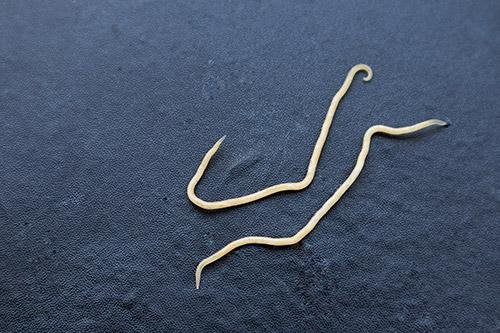
There are other worms that you can see in your stool but if you live in the UK and think you’ve seen something other than a pinworm in your stool, you haven’t. We simply don’t get these types of worm in the UK - you only pick them up if you have spent significant time in the tropics and subtropics.
It is very common for people to believe that they have seen a significant worm (i.e. not a threadworm) in their stool. This is because vegetable matter, mucus and shed intestinal lining can often have a worm-like appearance. These even have an unhelpful name “rope-worms” and the internet is awash with myths about these “worms” being responsible for all sorts of gut problems. As with many things on the internet, it’s nonsense.
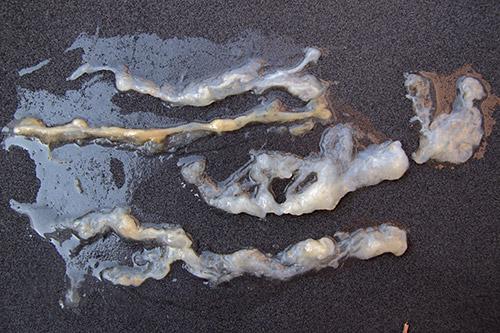
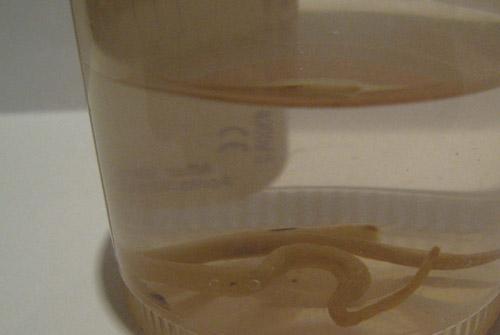
Do parasites go away on their own?
This really depends on the parasite. Threadworm infection doesn’t usually go away on its own and the recommendation is to have treatment. This is simple and you can just take a single dose of the over-the-counter medication mebendazole (sold as Ovex in pharmacies).
Cryptosporidium and Giardia often cause a “self-limiting” illness meaning that they get better on their own. This typically takes 10 to 14 days. However, sometimes the illness can persist and in these cases treatment with antibiotics is usually recommended.
People infected with Entamoeba histolytica, which causes amoebiasis, are usually recommended to have treatment even though they often have no symptoms.
Find out if you have a parasite with our Gut Bacteria, Worm and Parasite Test
Get tips on better health
Sign up to our emails on the better way to better health.
We'll keep you up-to-date with the latest research, expert articles and new ways to get more years of better health.


